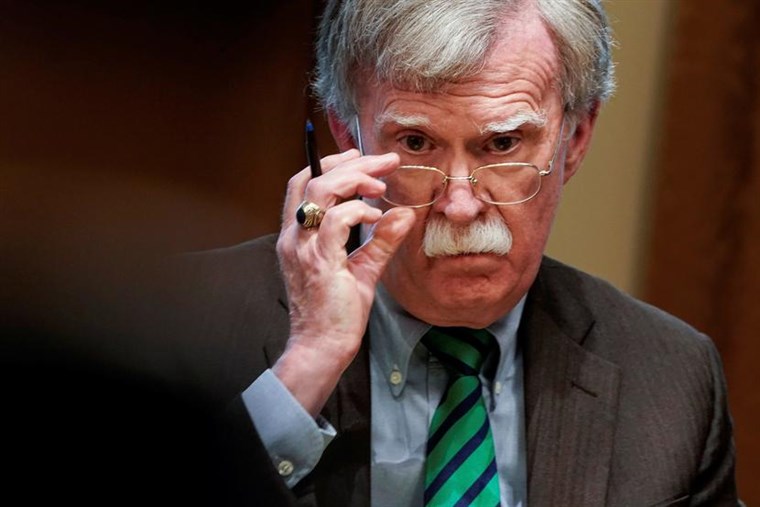Former U.S. National Security Adviser John Bolton in his new book, “The Room Where it Happened, ” has covered President Donald Trump’s policy on Afghanistan, including the peace talks and Trump’s insistence on a withdrawal of troops.
Bolton also reveals some less well-known aspects of the Afghan peace efforts led by President Trump’s special envoy Zalmay Khalilzad, who held talks with the Taliban for almost 18 months which ultimately led to the signing of an agreement between the two sides on February 29 in Doha.
Bolton writes that the first time he was involved in the peace process was on May 10, 2018, when Khalilzad “said he had been approached by people purporting to speak on behalf of various Taliban factions who wanted to talk peace.”
“He (Khalilzad) had spoken to others in the US government who could evaluate the bona fides of these approaches, but he wanted to give me an early heads-up in case they proved real, which by late July Khalilzad told me they had. I saw no reason further contacts shouldn’t proceed, not that I expected much, and he initially became a back-channel negotiator with the Taliban. Within a month, the role had expanded to Khalilzad’s being one of the growing number of State Department ‘special envoys,’ a convenient role that avoided having them confirmed in more traditional State positions.”
In another area of the book, Bolton criticized the US policies for the withdrawal of American forces from Afghanistan.
Bolton mentions that Trump had often called for the withdrawal of troops from Afghanistan despite his awareness of threats from terrorism from the country.
“At two p.m. on November 8, we convened in the Oval, with Pence, Mattis, Dunford, Kelly, Pompeo, Coats, Haspel, myself, and others present. Pompeo led off, but Trump quickly interjected, “We’re being beaten, and they know they’re beating us,” Bolton writes
Speaking more of the meeting, Bolton wrote: “Pompeo tried again, but Trump rolled on: “My strategy [meaning what ‘his’ generals had talked him into in 2017] was wrong, and not at all where I wanted to be. We’ve lost everything. It was a total failure. It’s a waste. It’s a shame. All the casualties. I hate talking about it.”
Bolton writes that when General Mattis talked about the threat of Daesh in Afghanistan, Trump said, “Let Russia take care of them. We’re seven thousand miles away but we’re still the target, they’ll come to our shores, that’s what they all say.”
Bolton says that in the same meeting, Trump told him that “We’ll never get out,” and “Millions of people killed, trillions of dollars, and we just can’t do it. Another six months, that’s what they said before, and we’re still getting our asses kicked.”
In an interview with ABC News about the book, Bolton called it a book of facts.
“Because I think it shows a pattern quite contrary to the image he would like to convey of the decisive president who knows something about what he was doing… This was not like a White House I’d ever seen before. It was not functioning in the same way as any of the three previous presidents I have worked for.”
Bolton writes in abother part of the book that President Trump was constantly confusing President Ashraf Ghani with former President Hamid Karzai.
Bolton writes about a meeting with Trump regarding Afghanistan:
“’How are the negotiations going?’ Trump asked, but cut almost immediately into Pompeo’s response, raising the endemic corruption among Afghan officials, especially Afghan President Ghani and his purported riches, although unfortunately confusing Ghani with former President Hamid Karzai, as he did constantly. Hopefully unnoticed, I signaled Dunford to jump in to say that the reduction in violence accomplished by our current strategy meant we could fulfill our ongoing counterterrorism and other missions in practice with reduced resources, even without agreement from the Taliban.”
“John Bolton in his book has clearly said that Mr. Trump was mostly focusing on non-relevant topics and was listening less to experts’ views,” said Jafar Mahdawi, the secretary general of Hizb-e-Millat-e-Afghanistan, a Kabul-based political party.
Bolton writes in the book that by late 2018, “Afghanistan was undoubtedly a sore spot for Trump, one of his principal grievances against the ‘axis of adults’ so beloved by the media. Trump believed, not without justification, he had given Mattis all the leeway he requested to finish the Taliban, as with finishing the ISIS territorial caliphate.”













